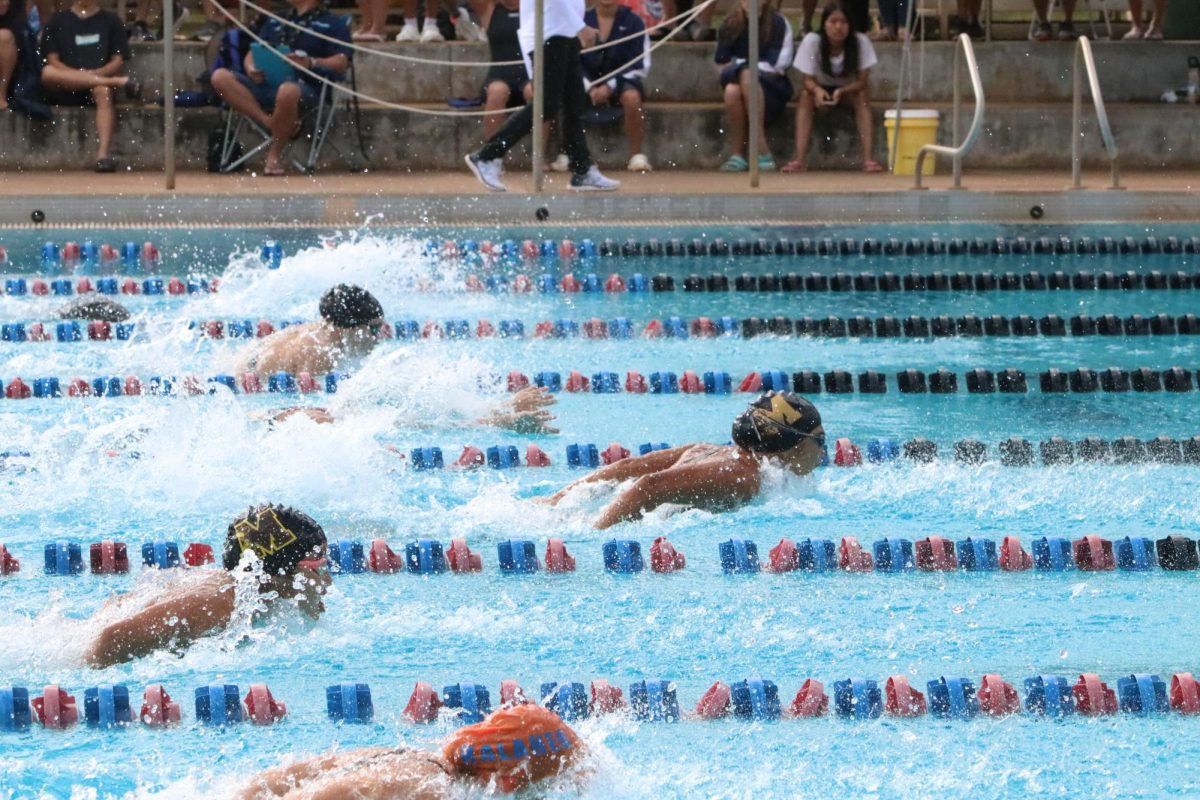Sleep: Something Students Lack
January 6, 2019
Ranked as the no. 1 public school in Hawai’i in 2018 by U.S. News, MHS excels as one of the top schools in the state. MHS offers various Advanced Placement (AP) courses, dozens of clubs, many extracurricular activities and has experienced great success in their athletic programs. However, the rigor of these activities has its drawbacks — due to a combination of course load, homework, sports, extracurriculars, or even jobs, a great deal of the student population is sleep deprived.
“Sleep is important in stress management, emotional and behavioral regulation, growth, and cognitive functioning. If we do not get enough sleep, we are not as productive as we can be, it affects our mood, which affects our well-being and relationships,” said Dr. Cathy Bell, a child and adolescent Psychiatrist. MHS AP Psychology teacher Doug Muraoka added, “Sleep has many functions, but the most important is the regeneration of cells necessary to fight off illness or disease. The second (function) is the enhancement of creative thought and problem solving.”
The negative effects of sleep deprivation aren’t limited to only occurring during waking hours. When sleeping, the body undergoes several changes, which can be greatly reduced due to sleep deprivation. “Sleep enables memory consolidation — during sleep, the brain transfers short-term memories to become long-term memories. In fact, sleep experts say that a student can learn better after ‘sleeping-on-it,’ particularly after learning a physical skill or something that requires higher level thinking like analyzing,” said Dr. Lynn Goya, a clinical Psychologist. “Of course, sleep replenishes our energy stores that we use while we are awake. Other research suggests that sleep contributes to the formation of new cells in the brain. Sleep may also reduce damage caused by oxidative stress. Molecules called free radical form naturally whenever the body metabolizes oxygen.”
The effects of sleep deprivation varies in extremity, some may be minor effects, while others can have damaging effects on the human body. These effects also range from short-term to long-term periods of time. “Although sleep deprivation affects everyone, research has shown that younger adults (including teens) are more negatively affected by sleep deprivation than older adults. Younger adults’ brains and bodies are still developing, and depriving it of rest and recuperation can be critical to future health,” said Goya. Bell added, “(Students may experience) depression, anxiety, psychosis, low self-esteem, (and) academic failure.”
Sleep deprivation is not limited to affecting only the mental side of students. The physical appearances of students can also be affected by lack of sleep. “(Students may have) more hanging eyelids, red and swollen eyes, darker under-eye circles, paler skin, more wrinkles and more droopy corners of the mouth,” said Goya.
In addition to these short term effects, long term problems may also arise due to continued sleep loss. These problems, while not visibly detectable when first beginning, may build up over time. “Studies have shown linkage between sleep deprivation to stroke and heart disease,” said Muraoka. Bell added, “(Students may experience) failure in college, poor relationships with family and friends, (and the inability to) reach one’s (full) potential.”
The effects of sleep deprivation can affect not only one person, but others around them. Many car crashes or workplace accidents have been linked to sleep deprivation. “Although it may be difficult to untangle cause and effects, it’s likely that sleep deprivation and problems controlling impulses and emotion worsen each other, leading to a ‘negative spiral’ of fatigue and sleepiness, poor decision-making and risky behavior. Research shows that staying up 17-19 consecutive hours is akin to having a blood-alcohol percentage over the legal limit. This doesn’t mean that the person actually has alcohol in their system – it means that their thinking and emotions are responding at the level of someone who is legally drunk,” said Goya.
There are various symptoms that indicate an inability to get the proper amount of sleep. While some signs are easily visible, others may remain unnoticed until sleep deprivation occurs over long durations of time. “Some of the obvious symptoms are the inability to stay awake during the day, fatigue, changes in appetite, memory, or behavior,” said Muraoka. Bell added, “(Students may experience) mood disturbances (e.g. depression and anger outbursts); thought disturbances (e.g. paranoia, negative thinking, depressed thoughts, anxious thoughts); and impairments in cognition (e.g. difficulty focusing, planning, organizing, memory problems).” These effects can contribute to a student’s performance both in and outside of school. They may also lead to problems arising with student’s mental health. Goya added, “(People may have a) weakened ability to deal with day-to-day stressors (and) ramp up brain areas that contribute to excessive worrying.”
Students vary in their need for sleep due to various genetic and environmental factors. Some may require six hours of sleep to function without tiredness, while others may need more than six to stay focused. Despite these variations, science has found the average amount of sleep teens should get on a daily basis. “Most studies indicate a number between six to nine hours as optimal,” said Muraoka. Dr. Goya added, “Research shows that a quarter of teens get no more than 6.5 hours of sleep a night.”
For many students, these numbers cannot be met on a daily basis due to homework and other responsibilities. However, students can solve this loss of sleep through various solutions. “If academics are interfering with sleep, it’s best to increase academic support from teachers and parents, or reduce the academic demand. Sleep is one of the top three predictors of success in adulthood,” said Dr. Bell.
Despite students’ tiredness or desire to sleep, some still struggle with the ability to fall asleep or stay asleep. While some students may be diagnosed with a sleeping disorder, others are simply unable to get a good night’s rest. However, there are various solutions to this problem. “In today’s modern and technological world, the simplest way to get better sleep is to eliminate your distractions which mostly come from the use of electronics. If you move your cell phone away from your bed, turn off the TV, etc, you’ll find you get a better nights sleep,” said Muraoka. Dr. Bell added, “Have a bedtime routine, ensure that (the) room is comfortable, cool, quiet, dark. Avoid caffeine late in the evening (and) sometimes late baths can keep one awake. Use (the) bed just for sleeping and not for homework.”
Additionally, sleep is affected by the physical and mental health of students. There are various ways in which pre-sleep routines can benefit a night’s rest. “Maintain a regular exercise routine. Research shows that exercise increases total sleep time, particularly the slow-wave sleep that’s important for body repair and maintenance. But try to exercise at least four hours before sleeping to give your body time to wind down,” said Goya. “Turn off your worried thinking. If you are feeling stressed or anxious, have a worry-journal where you write down all your worries (and imagine them being transported from your mind to the journal), just before bed. Or download an app with relaxing sleep music, or guided meditation.”
One of the biggest factors in knowing when to sleep are the goals which students set for themselves. For many, high goals may result in low amounts of sleep for consecutive weeks. “Say ‘when’ and don’t seek perfection. Perfection on homework or tests is an artificial threshold that you set – it is actually a continuum, for example, from 90 to 100 percent. Set a time to go to bed and study diligently until then. Then get some sleep. Seeking perfection robs you of (the) quality of life,” said Goya.
In high school sports, the constant practices and games causes damage to a student athlete’s body. For athletes, sleep plays a beneficial role in recovery, both physically and mentally. “Sleep and rest assist with basic injury recovery, allowing for increased metabolism, cell turnover and injury recovery. Studies have (shown an) associated increased risk for injury such as ACL tears with mental and physical fatigue. This may be related to decreased reactionary response times, resulting in the small stabilizing musculature to have delayed responses to finite movements, resulting in decreased stability and increased risk of injury,” said Meghan Shaw, a Physical Therapist at Jaco Rehab.
A common occurrence for students is to take a nap during free time; many times, this practice occurs at home but sometimes, students may choose to do this during school hours. However, there are various ideas pertaining to this practice and many believe that it can damage our nightly sleep patterns. “Naps can be beneficial as long as they are short in duration, around 15 to 20 minutes,” said Muraoka.
Many dangerous occurrences may happen due to a lack of sleep. One of the biggest dangers is an effect called microsleep. “Microsleep is a sudden onset of sleep lasting only seconds. They are uncontrollable and definitely dangerous if you are driving, operating machinery, or in any situation requiring your undivided attention,” said Muraoka.
While school and other activities are an important part of student’s lives, there is a heavy cost for not compromising and finding time to sleep. Sleep is vital in shaping teenagers’ physical and mental health — both in the present and for their futures. To be healthy, students can look to find a balance between sleep and their daily activities.



